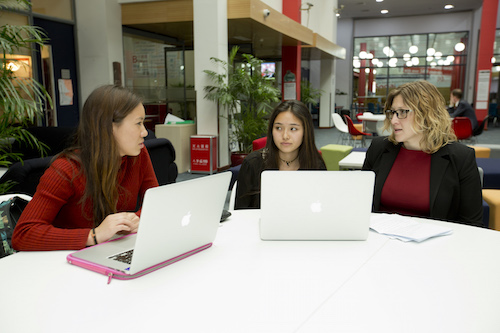When it comes to applying for university, international students may appear to be hugely advantaged. However, Heather Pineda says the rich worldview bestowed on those privileged pupils leaves them with a surprisingly unique challenge.
“These students are very open-minded, and have a strong international mindset,” says Pineda, director of university and careers counseling at Dulwich College Beijing (DCB), adding: “They’re frequently well traveled, and are thinking about applying to universities in three or four different countries. And they often don’t know where to even start.”
Thankfully, Pineda has plenty of advice to make that process less overwhelming. Below, she shares her top five tips for international school families who are readying their youngsters for post-secondary success.

1. Narrow it down.
It’s important for students to remember that, in the end, they have to make a decision, that they can’t split themselves in two. So, at Dulwich, we have students spend a lot of time thinking about what they want to do, what they like and what interests them, and we get them to do that very early on. It’s important not to overwhelm the students with this, of course, so we do it gradually. In Year 7 we do exercises to help the kids think about what kind of courses they’re interested in, whether they’re humanities kids or STEM (Science, technology, engineering and mathematics) kids, and so on. We provide them with research sheets, to help them consider the class sizes they’d prefer, the rigor of course work they want to take on, the kinds of majors and careers that would suit their interests, and so on. It’s all about guiding them towards more and more specific details, so that by Year 12 they have already researched plenty of universities, and have at least narrowed down what country they would like to go to. It’s all about going from a long list to a short list.
2. What’s in a name?
A successful student not only understands what’s a good fit for them academically, but also personally. You need to think about the ethos of the school, and whether or not it suits you. It’s good to understand that big name schools rank well, but not for their undergrad program. They’re well known because of their PhD students. And where did those top PhD students come from? The little schools with strong liberal arts and science specialities, like Swarthmore and Vassar. They sometimes get overlooked, because they don’t offer PhDs and therefore don’t get ranked. But they’re still fantastic schools, and are known for having better programs than the Ivies, depending on the program.

3. Remember: university is a community.
Once students have been accepted and enrolled, we encourage them to reach out and get involved before they even arrive at the university. Check the Facebook groups and social media for clubs and societies, or look at the online forums for dormitories, fraternities and sororities. I had one DCB student who found an off-campus roommate themed blog, run by students at the university she had been accepted to. She and the other users could ask each other questions, find a good fit, and get situated in an apartment. My other students have found forums or groups about film clubs, debate clubs, and other activities, and they’ll come to my office and say: “Oh my goodness! I met so many people, I have so many friends already!” If you get a sense of the community early on, and make a few friends or contacts in advance, then it makes the adjustment to living there much easier.
4. Don’t be sorry: ask away!
You don’t need to apologize for wanting to start early. I’ll have some parents coming to me timidly, saying:“I know my son’s so young, but is it okay if I ask about…?” And I’ll tell them: “Please ask!” Because you have a lot of ground to cover, being a parent of an international student. Don’t feel like you’re being silly. My son is only a Year 3 student and I already have questions about funding and scholarships and what would be the best fit. No one should be obsessing about university for years on end, but it’s great to keep it in the back of your mind and exploring your options, so that you have a solid footing when it finally does come time to apply.

5. Passion is paramount.
The most important thing that a person can do when they’re preparing for university is to just go with what they love. A lot of the kids we have graduating this year are “pointy students” who work hard to be specialized. We don’t harp on them about being perfectly “well rounded” or push them to do 20 different things. Because, if you think about it, there were 100,000 applications to UCLA last year, and 80,000 of them were the same academically. So what are the successful applicants doing to set themselves apart? It sure isn’t doing 20 different activities to be perfectly “well rounded.” Instead, they’re picking one or two things they really love, and knocking the socks off them. So go out there and find yourself an internship in a field you’re passionate about, or try to get yourself published, or even try to be entrepreneurial and set up a small business online. Telling someone to follow their passion may sound clichéd, but it’s actually some of the best advice you can take.
 This is the fourth in a series of posts brought to you by Dulwich College Beijing. DCB is made up of over 1430 students from age one to 18, with over forty-five nationalities represented in its diverse student body. It is a British international school, offering an educational environment designed to nurture not only the intellectual and physical but also social and emotional development of students. The school takes pride in an excellent pastoral care programme, as well as superb IB results. The school’s university counseling program is just one of its many attributes.
This is the fourth in a series of posts brought to you by Dulwich College Beijing. DCB is made up of over 1430 students from age one to 18, with over forty-five nationalities represented in its diverse student body. It is a British international school, offering an educational environment designed to nurture not only the intellectual and physical but also social and emotional development of students. The school takes pride in an excellent pastoral care programme, as well as superb IB results. The school’s university counseling program is just one of its many attributes.
Photos: Uni You, DCB




